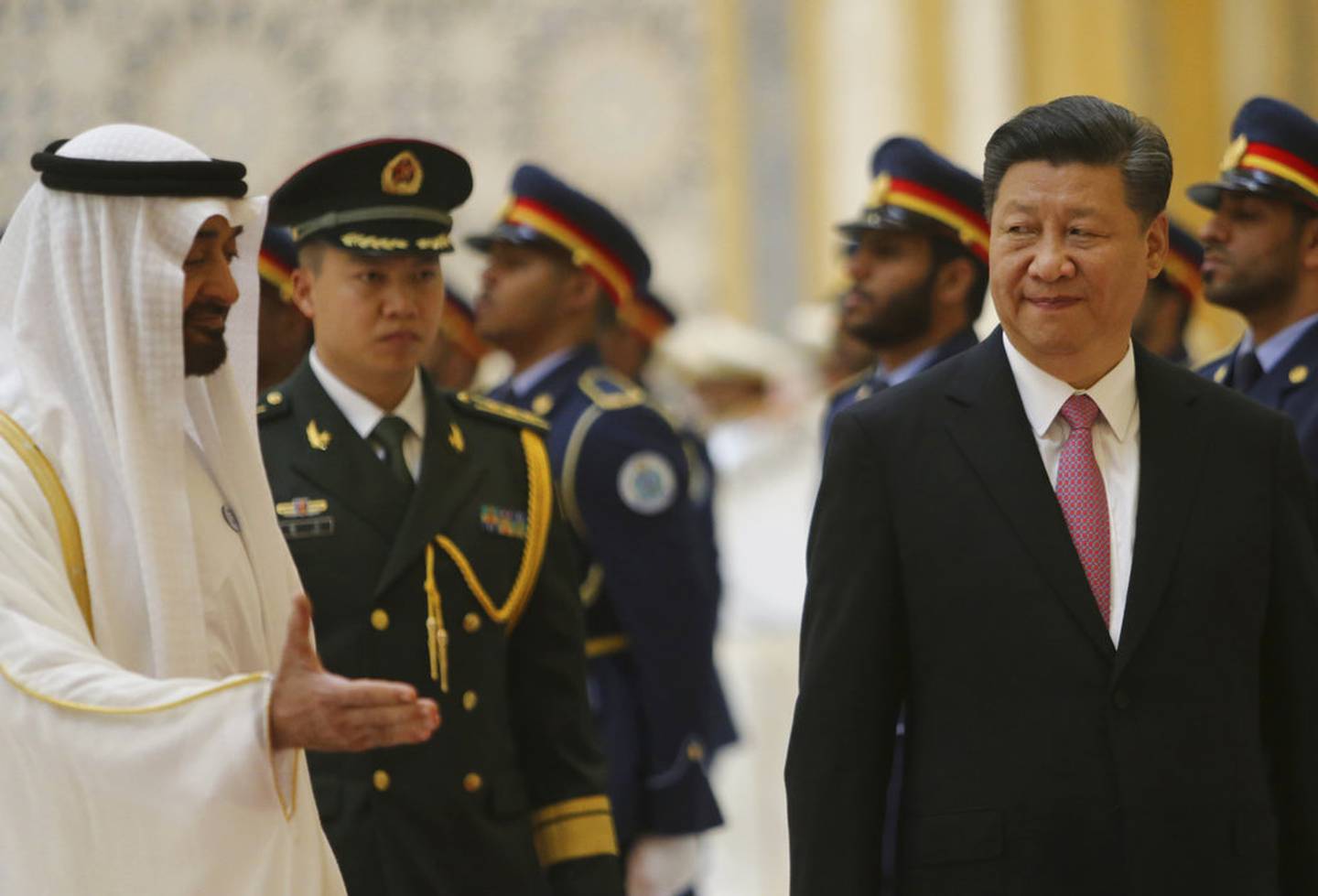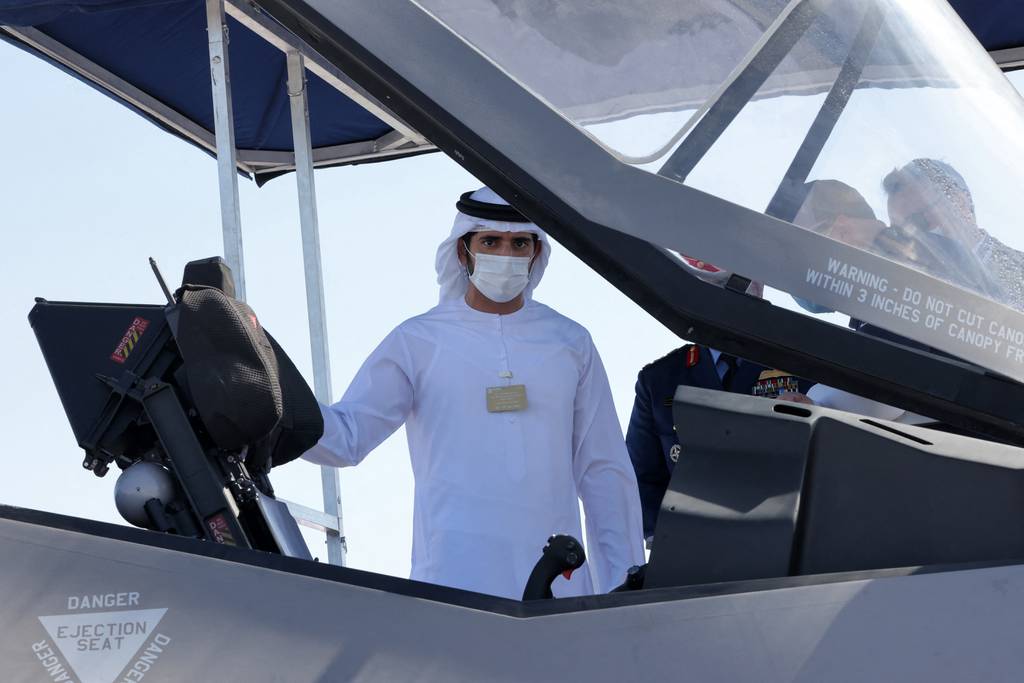BEIRUT — The U.S. was dealt a fresh blow last month when the United Arab Emirates suspended talks to buy the American-made F-35, and it appears Abu Dhabi is leaning further eastward as it continues working with Chinese 5G vendor Huawei.
Washington has warned allies for years that hiring Huawei to provide network services would jeopardize communications and intelligence sharing, and the Biden administration tried to levy security requirements on the F-35 deal to safeguard the high-tech aircraft from Chinese espionage. Experts say that pressure looks like it’s failing.
“F-35 is one of those things the U.S. is using as a way to exert influence over allies and partners around the world,” Emily Harding, a senior fellow at the Center for Strategic and International Studies, told Defense News.
And the UAE’s embrace of Huawei for 5G should only heighten U.S. concerns about Abu Dhabi getting the F-35, said Harding, who is also deputy director at the think tank’s International Security Program.
“Even if the F-35 itself is not using this 5G network, if the UAE is embracing Huawei 5G technology and using it for ground stations, communications towers, on bases, then that is an opportunity for China to draw a lot of intelligence about the way the F-35 operates,” she said. ”This is concerning because it is giving an adversary a lot of insight into our highest-functioning airplane.”
The UAE was negotiating a deal for 50 Lockheed Martin-made F-35s to add a fifth-generation fighter jet capability to its fleet. The proposed sale came at the end of the Trump administration, rising out of a deal that saw the UAE recognize Israel. The $23 billion deal also included armed drones and other defense equipment sought by the Emirates.
After President Joe Biden came into office, his administration put the arms sale and others on hold. That in part was because of the UAE’s involvement in the years-long war in Yemen, which sparked the world’s worst humanitarian crisis and rages on today. But Huawei’s work in the UAE is also part of the equation.
Huawei partnered with du, a UAE-based telecoms firm, to roll out 5G network services, according to an October 2019 statement by the company’s chief technology officer, Saleem Alblooshi. He assured the public that du has its own labs in the UAE, and that “we have not seen any evidence that there are security holes specifically in 5G.”
Two months later, the country’s Telecommunications Regulatory Authority — now known as the Telecommunications and Digital Government Regulatory Authority — hired Huawei to open a “5G & IoT Joint OpenLab” in Dubai.
Data security
“5G is advanced because it provides very high-bandwidth connectivity at a short distance, but at long distances it has a more difficult time. The way the militaries are moving in modern warfare [brings with it a] very high data dependency,” Harding told Defense News. “Knowing the adversary’s intentions, [enabling] faster decision-making, securing people and developing more technology — and 5G is enabling that.”
However, “the UAE is saying Huawei’s 5G technology will not touch the military sector. This is an optimistic aspiration, but anybody who has worked in the defense sector for more than a minute understands the bleed-over between the commercial and military sector,” Harding added. “It is entirely possible the Huawei equipment will not end up in the UAE military systems, but it is still a concern.”
“By far it is the cheapest alternative, but when you’re buying it, you are also buying the Chinese window into your operations,” she noted, referring to the Chinese government’s investment in Huawei.
Andreas Kreig, a senior lecturer at King’s College London, said U.S. concerns go deeper than 5G technology. “It is more about how the UAE is working with Chinese companies to advance sophisticated technology — AI technology in particular — which is Chinese-based,” he told Defense News.
One joint effort on artificial intelligence is the China-Emirates Science and Technology Innovation Laboratory, which showcased drones developed by both the UAE and Chinese firm NORINCO at last year’s Dubai Air Show and IDEX defense conference. It’s unclear whether the drones are capable of using 5G telecommunications.

“Looking at the UAE intelligence services ... they have solid cooperation with China, and data exploitation is used for that. It is obviously linked into infrastructure that is also relevant for the military. Dual use in that respect — including data and even data that stays in the military domain — will be used and exploited in central hubs and centers that are not necessarily for the military but are part of ... national security,” Kreig said.
On the F-35 in particular, Kreig said “data won’t be shared across networks when the fighter jet is in the air. However, the entire flight can be analyzed in exercises against particularly Russian or Chinese aircraft or batteries, when the Emiratis will train to take out these hostile platforms [or] avoid them. The entire data, second by second, will be available and downloaded from the plane into servers that are operated by Chinese companies or Chinese technology, or will be stored in facilities that Chinese companies will have access to.”
Asked about the use of different frequencies to separate military and civil communications, Krieg said they’d still run through the same mast, which 5G network operators could access. One weak node in the network could make the entire setup vulnerable, he added.
“The issue [for the U.S.] was never about using 5G to communicate,” he explained, “but it is about the data exploitation, once it has been transmitted toward the ground, and what is happening to that data on the ground.”
Harding also stressed this point, noting Chinese law allows the government to “pull back anything passing through Chinese business channels.”
Josh Kirshner, a former U.S. State Department arms control official, said the Biden administration appears to want the F-35 deal to succeed, but the UAE’s threats to pull out of the deal and its recent willingness to host a Chinese military facility will create political roadblocks in Washington.

In early December, a top Emirati diplomat acknowledged the UAE stopped construction on a Chinese facility at an Abu Dhabi port that America considered a military base. “We took these American concerns into consideration and we stopped the work on the facilities,” Anwar Gargash told a meeting of the Arab Gulf States Institute in Washington. “But our position remains the same, that these facilities were not really military facilities.”
Asked whether an F-35 sale to the UAE is still possible, Harding expressed doubt, partly because the country signed a deal with France in December to buy 80 upgraded Rafale fighters.
“It depends on how much each side wants it. The UAE has advanced fighter jets now, so they may decide it’s not worth it. The U.S. wants to keep strong ties with the UAE,” she said. “The deal may be revived if the UAE decides to completely eliminate any Huawei [technology associated with] any military activity. It is expensive but doable, and it will require hypervigilance to be sure that every contractor and member of the military [is] creating that wall.”
For his part, Kreig believes the onus falls on the United States.
“Now the ball is in the U.S. court. It is more likely that the Biden administration will come out with a meaningless concession for the Emiratis to be able to publicly say why they allow the deal to go through. This may include creating the U.S.’s own little hub of data companies in the UAE to compete with Chinese companies,” he said.
Joe Gould in Washington and The Associated Press contributed to this report.
Agnes Helou was a Middle East correspondent for Defense News. Her interests include missile defense, cybersecurity, the interoperability of weapons systems and strategic issues in the Middle East and Gulf region.








